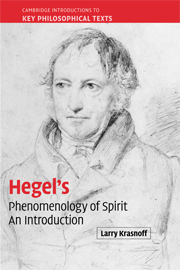6 - Theory
Published online by Cambridge University Press: 23 December 2009
Summary
We have seen that Hegel's philosophical project is to vindicate a particular conception of subjectivity, and to demonstrate its essential connection to the idea of rational justification itself. To make this argument convincing, however, Hegel must not presuppose this conception of subjectivity. Rather he must consider and eliminate the possibility that there could be a rational conception of the world that does without it. And in fact a traditional aspiration of philosophy is to achieve a conception of the world that does without subjectivity of any kind. To know something, on this traditional view, is simply to know it as it is in itself, without any contribution from us. Call this a purely theoretical view of knowledge: to know the world as it truly is, we must stand apart from the world, in an entirely disinterested or contemplative posture.
Hegel's own view, of course, is that this view of knowledge is incoherent: were we to assume a purely theoretical standpoint, we could never achieve anything that we would count as knowledge. To show this, we subject the purely theoretical standpoint to skeptical critique. We imagine a person committed to the purely theoretical standpoint, and ask her how she might defend her beliefs as true.
SENSE-CERTAINTY
What would a purely theoretical view of the world look like? Hegel argues that we must begin with the theoretical aspiration in its simplest and most radical form.
- Type
- Chapter
- Information
- Hegel's 'Phenomenology of Spirit'An Introduction, pp. 77 - 92Publisher: Cambridge University PressPrint publication year: 2008

